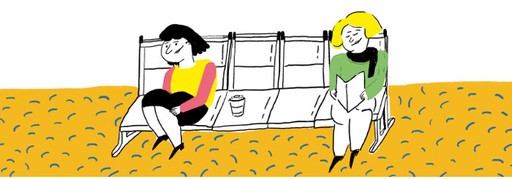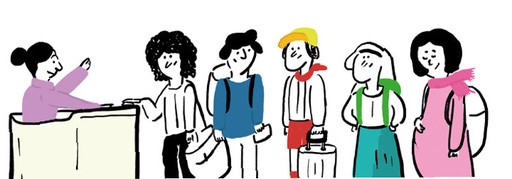機場沒有告訴你的事
現代的機場不只是交通運輸點,也是繁忙的零售中心。從機場的建築、光線到免稅商店所販售的商品,其實都有許多隱藏的策略。進入本文前,請先想想如何表達以下單字:
(A) 下意識
(B) 揮霍
(C) 從報到到行李託運
Here are a few behind-the-scenes tricks airports use to help travelers relax, get to their gates on time, and hopefully spend some money along the way.
以下是機場幕後使用的操作方法,以協助旅客放鬆心情,準時抵達登機門,並且在通往登機門的路上消費。
1. They make sure you can see the tarmac 看得到停機坪

Travelers should be able to get from security to their gate without getting lost. In many new airports, passengers can see through to the tarmac immediately after they leave security.
旅客應能順利從安檢走到登機門。在許多新機場,乘客離開安檢後,便能立即從玻璃窗看到停機坪。
2. The signs send (A) subliminal messages 標誌傳遞下意識訊息
Very, very little in the style of an airport sign is arbitrary. For example, the change of shape from one sign system to another can warn passengers that they are going the wrong way.
機場標誌看似不經意其實都是刻意設計的。舉例來說,標誌形狀的轉變,可警告乘客走錯路了。
3. They lighten the mood 讓你心情愉快
Newer airports incorporate as many windows as possible, even in stores. There's a trend that the shops face the tarmac. Passengers tend to walk into shops with access to sunlight.
新機場都盡量設置窗戶,即使是在商店內。新趨勢是商店面對停機坪,因為乘客喜歡步入有陽光的商店。
4. They herd you with art 以藝術來指點方向

That big sculpture in your terminal isn't just there to look pretty. It's another tool to help travelers navigate. It may serve as a handy rendezvous for you and your friends.
航站裡的大型雕像不僅賞心悅目,還能協助旅客在機場內定位,它能作為你和朋友的碰面地點。
5. They use carpeting 鋪設地毯

In many airports, the gate waiting area is carpeted. This is an attempt to make holding areas more relaxing by giving them a soft, cozy feeling. Happy, (1) laid back travelers are prone to (B) splurge.
許多機場的候機室皆鋪設地毯,這是為了營造柔和、舒適的氣氛,讓乘客更加放鬆。快樂、輕鬆的旅客較捨得揮霍。
6. The “golden hour” is key for profit 「黃金小時」獲利關鍵
The time between when a passenger clears security and boards their plane is called “dwell time.” This is when passengers are (2) at loose ends and most likely to shell out. Especially crucial is the “golden hour,” the first 60 minutes spent beyond security.
乘客通過安檢到登機前的時間,稱為「停留時間」。此時乘客無所事事,最容易血拼。其中「黃金小時」特別關鍵,也就是通過安檢後的六十分鐘。
7. They're increasing dwell time 增加停留時間
One hour more at an airport is around $7 more spent per passenger. Anything that's automated, (C) from check-in to bag drop, is meant to speed things up so that the dwell time is increased.
乘客在機場每多停留一小時,便大約多花7美元。任何自動化程序,像是報到及行李託運,皆為了加快通關時間,以增加停留時間。
8. Walkways curve to the left 走道彎向左邊

The majority of humans are right-handed, which affects airport design. More sales are generated if a walkway curves from right to left with more merchandise and space on the right side.
大多數人是右撇子,因而影響機場設計。走道從右向左彎時,右側會有更多商品及空間,銷售成績更佳。
9. The security officers get conversational 安檢人員愛聊天
A good tactic of screening passengers is simply to have a word with them. A study has found that asking open-ended questions is 20 times more effective than trying to monitor based on behavior.
檢查乘客的一個好方法,就是和他們聊天。研究發現,對乘客提問開放式問題,比觀察乘客行為效果好20倍。
10. A single queue puts us at ease 單一隊列讓旅客安心

While the line for check-in and security may seem absurdly long, a single queue actually lowers stress levels by increasing the perceived sense of fairness.
雖然報到及安檢的排隊人龍似乎長到不像話,但是單一隊列其實能夠減輕壓力,因為乘客會覺得比較公平。
口語詞彙:
(1) Laid back 閒散
這裡的laid是lay的過去式,laid back是「懶散、閒適、鎮定自若」的意思。
Why are you so laid back? The exam is in 30 minutes!
你怎麼還這麼鎮定?考試30分鐘之後就要開始了!
(2) At loose ends 無所事事
通常因為事情起了變化而造成的無所事事。
Mary has been at loose ends ever since she graduated from college.
瑪麗大學畢業後便一直無所事事。
參考資料:mentalfloss.com
(A) 下意識
(B) 揮霍
(C) 從報到到行李託運
Here are a few behind-the-scenes tricks airports use to help travelers relax, get to their gates on time, and hopefully spend some money along the way.
以下是機場幕後使用的操作方法,以協助旅客放鬆心情,準時抵達登機門,並且在通往登機門的路上消費。
1. They make sure you can see the tarmac 看得到停機坪

Travelers should be able to get from security to their gate without getting lost. In many new airports, passengers can see through to the tarmac immediately after they leave security.
旅客應能順利從安檢走到登機門。在許多新機場,乘客離開安檢後,便能立即從玻璃窗看到停機坪。
2. The signs send (A) subliminal messages 標誌傳遞下意識訊息
Very, very little in the style of an airport sign is arbitrary. For example, the change of shape from one sign system to another can warn passengers that they are going the wrong way.
機場標誌看似不經意其實都是刻意設計的。舉例來說,標誌形狀的轉變,可警告乘客走錯路了。
3. They lighten the mood 讓你心情愉快
Newer airports incorporate as many windows as possible, even in stores. There's a trend that the shops face the tarmac. Passengers tend to walk into shops with access to sunlight.
新機場都盡量設置窗戶,即使是在商店內。新趨勢是商店面對停機坪,因為乘客喜歡步入有陽光的商店。
4. They herd you with art 以藝術來指點方向

That big sculpture in your terminal isn't just there to look pretty. It's another tool to help travelers navigate. It may serve as a handy rendezvous for you and your friends.
航站裡的大型雕像不僅賞心悅目,還能協助旅客在機場內定位,它能作為你和朋友的碰面地點。
5. They use carpeting 鋪設地毯

In many airports, the gate waiting area is carpeted. This is an attempt to make holding areas more relaxing by giving them a soft, cozy feeling. Happy, (1) laid back travelers are prone to (B) splurge.
許多機場的候機室皆鋪設地毯,這是為了營造柔和、舒適的氣氛,讓乘客更加放鬆。快樂、輕鬆的旅客較捨得揮霍。
6. The “golden hour” is key for profit 「黃金小時」獲利關鍵
The time between when a passenger clears security and boards their plane is called “dwell time.” This is when passengers are (2) at loose ends and most likely to shell out. Especially crucial is the “golden hour,” the first 60 minutes spent beyond security.
乘客通過安檢到登機前的時間,稱為「停留時間」。此時乘客無所事事,最容易血拼。其中「黃金小時」特別關鍵,也就是通過安檢後的六十分鐘。
7. They're increasing dwell time 增加停留時間
One hour more at an airport is around $7 more spent per passenger. Anything that's automated, (C) from check-in to bag drop, is meant to speed things up so that the dwell time is increased.
乘客在機場每多停留一小時,便大約多花7美元。任何自動化程序,像是報到及行李託運,皆為了加快通關時間,以增加停留時間。
8. Walkways curve to the left 走道彎向左邊

The majority of humans are right-handed, which affects airport design. More sales are generated if a walkway curves from right to left with more merchandise and space on the right side.
大多數人是右撇子,因而影響機場設計。走道從右向左彎時,右側會有更多商品及空間,銷售成績更佳。
9. The security officers get conversational 安檢人員愛聊天
A good tactic of screening passengers is simply to have a word with them. A study has found that asking open-ended questions is 20 times more effective than trying to monitor based on behavior.
檢查乘客的一個好方法,就是和他們聊天。研究發現,對乘客提問開放式問題,比觀察乘客行為效果好20倍。
10. A single queue puts us at ease 單一隊列讓旅客安心

While the line for check-in and security may seem absurdly long, a single queue actually lowers stress levels by increasing the perceived sense of fairness.
雖然報到及安檢的排隊人龍似乎長到不像話,但是單一隊列其實能夠減輕壓力,因為乘客會覺得比較公平。
口語詞彙:
(1) Laid back 閒散
這裡的laid是lay的過去式,laid back是「懶散、閒適、鎮定自若」的意思。
Why are you so laid back? The exam is in 30 minutes!
你怎麼還這麼鎮定?考試30分鐘之後就要開始了!
(2) At loose ends 無所事事
通常因為事情起了變化而造成的無所事事。
Mary has been at loose ends ever since she graduated from college.
瑪麗大學畢業後便一直無所事事。
參考資料:mentalfloss.com
